My odyssey through Etria, Lagaard, the Drowned City, and beyond.
An Etrian Odyssey retrospective.
I have an obsession with Etrian Odyssey. A profound obsession. I own every single game in the series barring the Japan-only Etrian Mystery Dungeon 2. I have played and beaten every mainline game except 5. I own doujin CDs of the fantastic music, some of which my friends and I have graciously uploaded to our Youtube channel. I even own a Protector figurine, and in due time with steadier income I will haggle and buy more. It's inspired me to craft my own DnD-esque experience based on my love of the Etrian Odyssey series. It has brought my circle of friends closer together having a common series to swoon over. My pen-name here is a reference to the shopkeeper in Etrian Odyssey 3. I have collectively put hundreds, if not close to 1000 hours in all of these games combined. I love Etrian Odyssey. It is my favorite game series. This is my love letter to Etrian Odyssey.
It all started with an JRPG fix I needed in 2007. I was living with my mom, or just starting to live with my dad—it's all hazy to me. But the only thing I do remember is putting a weird little JRPG on reserve at Gamestop, intrigued by the first-person dungeon-crawling laced with a fun new gimmick: drawing maps on the DS touchscreen to chart your progress. It was an ingenious idea—most JRPGs used the touchscreen as menu navigation and clicking little icons for battles or pasting a pre-drawn map on it, a rudimentary way to use it. Drawing maps was revolutionary: it was such a simple but obvious way to chart your course, turning navigating simple dungeons into a lesson about taking notes. You could mark the map for dangerous enemies, hazardous floors, even shortcuts to save time while traversing the depths.
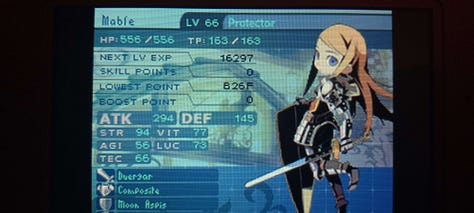
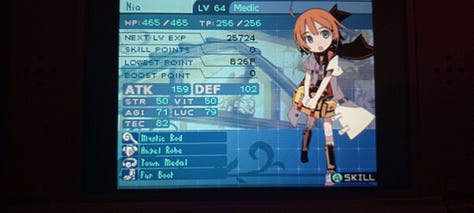
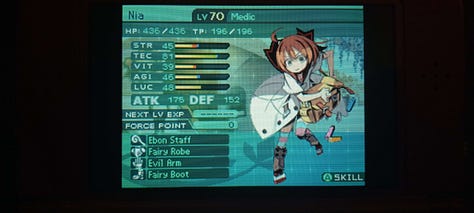
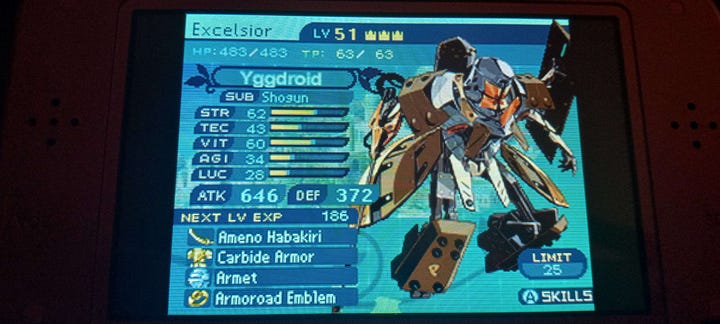
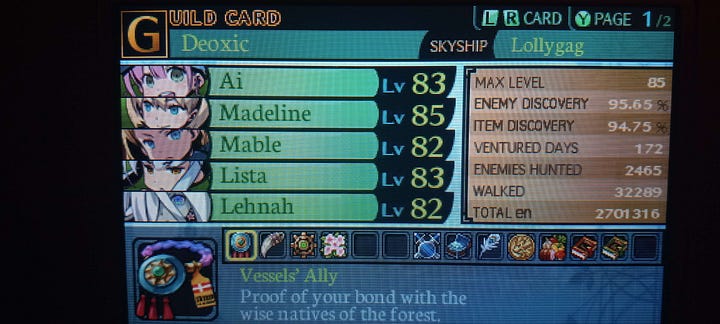
And that's just being said for the mapping mechanic: Etrian Odyssey 1 was a rough game with even rougher combat encounters; the game felt brutally difficult where even the random enemies could wipe your party if you weren't playing your cards right. The first few hours of any EO game are the hardest, typically—it was intentional design to have only five party members where all the classes are designed specifically so you couldn't run a complete party. You had to make sacrifices to coverage, and learning to play around those blindspots in your party was what would make or break it. There is definitely a wrong way to play Etrian Odyssey, and the first game was relentlessly swift and unforgiving in that punishment. This was a game where healing at the inn would not revive dead party members, so getting a Medic teched into reviving became vital early on just to save money. Making runs into the stratum was about economizing your time spent down there; you cherished and held onto items because they were so expensive, you cherished your Warp Wire as your last-resort “things are fucked” lifeline. You could only hold 60 items, so you wanted to balance out your expendable items filling your inventory to make room for all the monster parts and harvesting outcrops to carry back to base. Early on, there was very much a fear of going “I could lose money from this run” if you fucked up.
The dungeons themselves were filled with diabolical traps and moral choices that could be a boon to new adventurers or a harsh reality check to how unfair the game could be (LEAVE THE SQUIRRELS ALONE). You would second-guess being greedy knowing how badly you could be punished for it. There could be treasure chests surrounded by the dreaded FOEs, the “field-on enemies” that you can visibly see and leave you ridiculously undergeared and underleveled. A struggle with an FOE could leave your entire party battered and in a massive deficit, and in the second game they yield no experience, only rare drops for better gear, but you'd like burn through enough money killing them so it was always a dangerous choice to fight them.
Every other Etrian Odyssey game after EO2 made things a bit softer for players: shortcuts were clearly marked and slightly more abundant. FOEs and quests gave experience. You no longer had to revive your dead party members at the Apothecary. But even with these generous changes, the game retained its unyielding and brutal challenge, knowing you'd be all the better for it. And you were. As time goes on and your party members get deeper into their specs, get a little bit better gear, you start feeling your party come together at last. The game still retains its brutal harshness, but you feel better suited for the challenge. The progress curve in EO remains one of its most rewarding facets—you truly feel like your party is becoming a well-oiled monster-mulching machine and your expeditions last a bit longer, you feel less reliant on rare and expensive expendable items.
And then you get too big for your britches and either get ambushed, or you take on an FOE fight you're over-confident for and you're left hobbling back to base, a bit wiser in knowing that you can never get complacent.
Etrian Odyssey's brutal and harsh gameplay is complimented by its ambiance. Every stratum theme does a good job of setting the mood, and every ascension into a new stratum brings a new sense of wonder of what weird gimmick it'll bring or what new monster will fuck you up until you're adequately prepared for it. The game frames the labyrinth as a harsh world. Side characters and eager new adventurers will die. The embittered veteran who's lost comrades knows to never get complacent. There are even some characters you may like end up getting killed or horrifically scarred by what they witness in the labyrinth. The world is not a friendly place, and any sense of wonder evoked brings about that trepidation of what horrors lurk in the unforgiving maze.
I think my favorite game in the series remains Etrian Odyssey 3 for a variety of reasons. For one, the general tone and aesthetic are probably the strongest and most unique the series has seen—sailing the grand seas and conquering the labyrinth has never felt so engaging than it has in this game, especially with its fantastic support cast of characters. There are serious moral decisions present in the game that can affect who lives, who dies, what ending you get, who you ally with, etc. There are two endings that both feel like bad endings and a true ending that's obtuse and difficult to get. The ocean-themed game has some of the most alien-feeling places in the series, culminating in a sixth stratum that's truly fantastic and horrifying. And on top of all of this, the game has a robust class system dramatically different than every other game in the series that's all the better for it, and a daunting subclass system that encourages you to find ways to break the game. Break it as much as you can, for the challenges that await you anticipate that you do.
Nexus remains arguably the quintessential EO experience, fanservice distilled down into its purest form for the series. It's EO greatest hits. EO4 is also marvelous for building on what EO3 did with a compelling overworld exploration function and an equally daunting subclass system. EO5 is a return to a slightly purer experience that I respect, but it remains the only EO game I have not seen to the end and I plan on changing that. If this series scares you, the Untold games have a more coherent narrative and story-driven spice that moves away from the TTRPG/DnD style of the earlier games. Whereas EO feels like a roleplaying game where you craft your own narrative, the Untold games do it themselves and your mileage may vary. I found the grimoire stone system to be a bit cumbersome and inelegant as a response to increasing depth, but again your mileage may vary.
But I talked enough about Etrian Odyssey. I love you, Etrian Odyssey. I hope that the HD remasters spurs some love for the series and we can see it continue, even if its current iteration with drawing maps has mostly passed on with the DS and 3DS.






